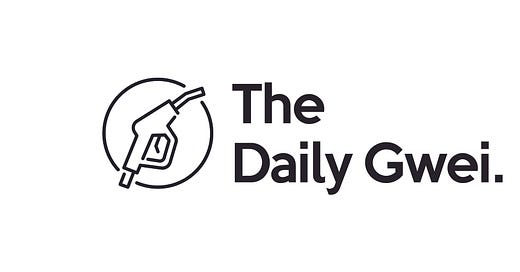Not Your Keys, Not Your Coins - The Daily Gwei #134
Get your coins off of centralized exchanges folks!
Gitcoin is the best way to support all of the work I do at The Daily Gwei so if you’d like to donate you can click the button below - thank you to everyone who donates!
Yesterday I wrote about the importance of running an Ethereum full node and why you should spin one up yourself. Today, I’m going to write about something equally if not more important - getting your cryptocurrency off exchanges and into your own wallet.

Centralized exchanges (CEXs) are not like traditional banks in that they don’t have the support of a government behind them. Many of them are located in jurisdictions that allow them to operate more freely and are less encumbered by financial regulations than banks are. Of course, this is good for the exchange but this can be very bad for you. You don’t actually own your crypto when it’s on an exchange as you are merely trusting that they will honor your withdrawal request when you decide to do so.
Obviously I understand that the convenience of keeping your coins on an exchange is very nice - especially if you don’t trust yourself to keep your own crypto secure. I mean, this is one of the reasons we put our money in a bank, right? We don’t want to keep all of our money as cash and stash it under our mattress where it’s easily stolen. Though, crypto is different in that it is digitally native - that is, you don’t need to “convert” your physical cash into digital dollars by putting it into a bank (you’d do this to participate in the digital economy) - all you need to do is withdraw your crypto to your own wallet from an exchange and then you can use all that Ethereum has to offer.
Another major drawback of centralized exchanges is that they are honeypots for attackers and are regularly hacked with user funds being stolen. This particularly applies to the “tier 2” or “tier 3” exchanges rather than the “tier 1” ones like Coinbase or others based in the U.S. so it really depends on what CEX you use. Though the tier 1 exchanges aren’t immune to hacks either but they are generally insured against them (Coinbase insures all accounts up to $250,000). We don’t have this type of insurance on user funds in DeFi just yet but I think we will eventually - imagine being able to insure the funds in your cold storage using an on-chain protocol like Nexus Mutual (though there are still major issues to work out here).
There are plenty of options to secure your crypto and they really aren’t difficult to set up and maintain. The way that people tend to use them is that they have a “hot wallet” for every day transactions such as MetaMask or a mobile wallet, a “cold wallet” for long-term storage (a “savings account”) such as a hardware wallet like Ledger or Trezor and they may keep a small amount of crypto/fiat on centralized exchanges that they wouldn’t cry over if they lost it. Now, there are of course more solutions than just this but I think it’s not worth complicating it as that tends to scare people off. There’s a good guide on the Ethereum.org website here to help you get started.
Lastly, as I discussed in this piece, there is the very real threat of tightening regulations coming for CEXs - especially those based in the U.S. There is a reality where you may have to go through a lot of difficult hoops just to be able to withdraw your crypto from a CEX. In the worst case, it may even get to the point where you’re not allowed to withdraw crypto to your own wallet at all!
So always remember - not your keys, not your coins.
Have a great day everyone,
Anthony Sassano
Join the Daily Gwei Ecosystem
All information presented above is for educational purposes only and should not be taken as investment advice.





Can you dumb this down for me? My eth is currently on Crypto.com and Kraken. Are those wallets or CEXs? The eth in Crypto.com is staked until eth2 happens. Kraken’s holdings are locked for 90 days earning yield.
I appreciate your advice!
Although I agree with this old principle, I have been in crypto for more than 6 years and I still find it stressful to store my crypto on my own, and this despite the fact that roughly half of the exchanges I have been registered to ended up being scams.
I think that's because I still somehow don't feel totally comfortable with mnemonic.
Thus I am still holding a significant portion of "my" crypto in exchanges, in order to have risks of different nature.
If I am not ready for this (developer, geek, privacy-friendly person), I won't ask my friends to be so.
I am starting to explore the "L2" wallets such as Loopring or Argent and I like the way the recovery works.
I am sure in the future it will be considered crazy to own your asset in a single-sig account without recovery alternative.
Thus I would not encourage people to do that with large amount of capital, because it expose them to what can be a bigger risk than exchanges : themselves.